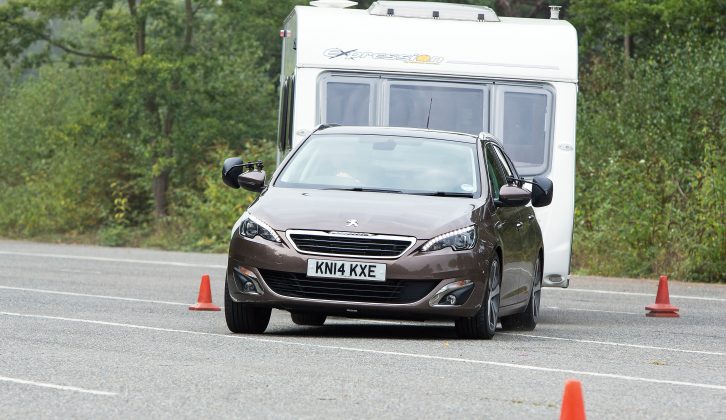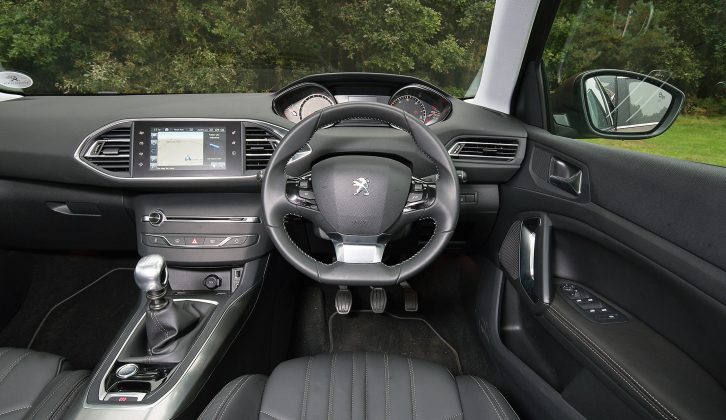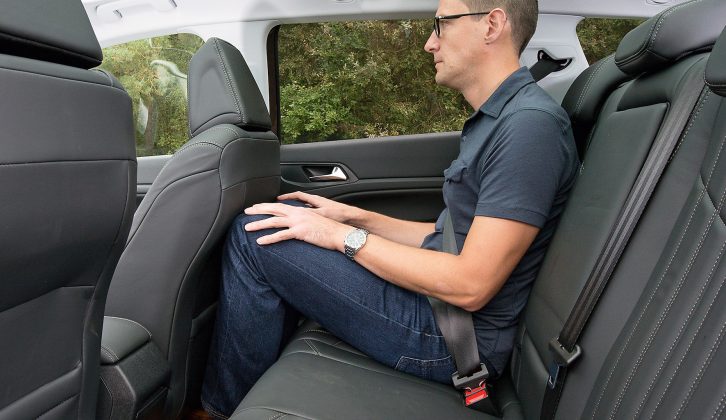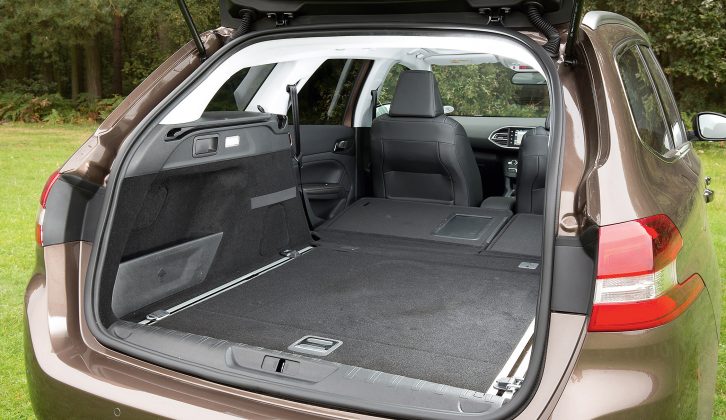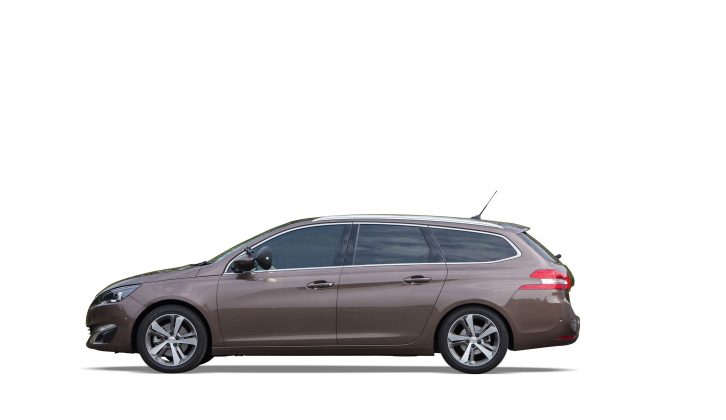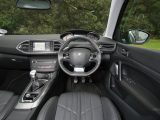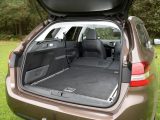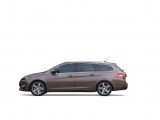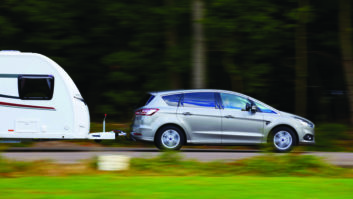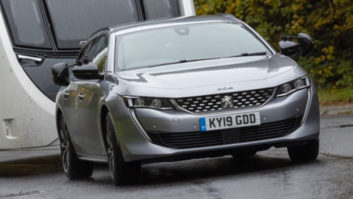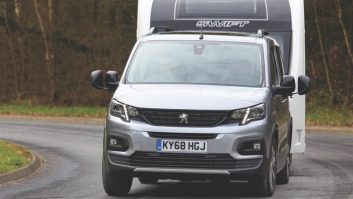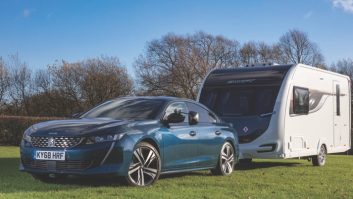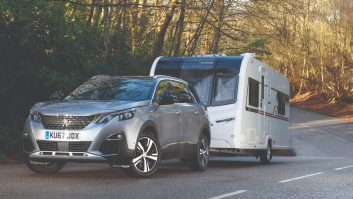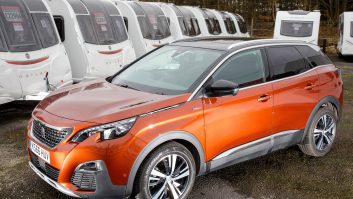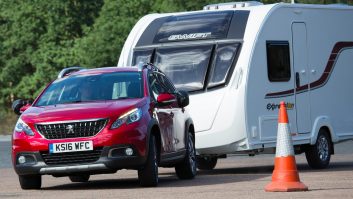Verdict
The Peugeot 308 SW has some tough rivals, but if you’re shopping for an estate car in this price band the SW deserves a close look. It’s stable when towing, and combines strong performance with excellent economy, lots of luggage room and competitive space for passengers. It’s a stylish and appealing alternative to the likes of the Škoda Octavia Estate.
Don’t just take our word for it, though, find a Peugeot dealer near you and book a test drive!
Pros
Stable when towing
Economical to run
Plenty of luggage space
Stylish
Excellent torque
It has good brakes
Spacious for all passengers
We achieved 30.3mpg towing
Cons
Soft suspension
High gearing means fifth gear for motorway towing
Need third gear to tow up hills at 50mph
Depreciates faster than a VW Golf
The Peugeot 308 SW is the estate version of the Peugeot 308. Rather than simply grafting on more luggage space to the back of the hatch, Peugeot has increased the wheelbase to create more passenger room. It also bodes well for improved stability on tow.
An estate should be more practical than the hatch, but is the 308 SW is a better tow car, too?
In this Peugeot 308 SW tow car test we looked for determined acceleration with a caravan in tow and a secure and stable feel.
Boot space is huge, with a capacity of 660 litres including underfloor storage
Towing
Like most modern cars, the 308 SW has been on a diet.
Its low kerbweight (just 1390kg including 75kg for the driver) helps its economy, but isn’t great news when choosing a caravan. Sticking to the 85% rule means an 1182kg maximum.
Yet the towing limit is 1500kg and, since the major clubs advise that up to 100% of kerbweight is acceptable for experienced towers, we matched the 308 to a Swift Expression 520 with a Mass in Running Order of 1303kg.
That’s a 94% match, yet we had no problem with stability. At 60mph the Peugeot felt fully in control, even when passing high-sided vehicles, and on a breezy day it needed only slight steering inputs to keep the outfit straight.
The 308 took the lane-change test in its stride. Relatively soft suspension allowed quite a bit of body roll, yet the Peugeot didn’t feel wayward and the van remained firmly in its place.
It also shows a decent turn of speed, so long as you’re in the right gear. The ratios have been chosen with a strong emphasis on economy and we found ourselves in third when towing up steep inclines at 50mph.
The engine turns at just over 1500rpm at 60mph in sixth, so is more comfortable in fifth when towing on the motorway.
Accept that, and the 308 SW shifts along at a healthy rate. Accelerating from 30-60mph took a respectable 11.8 seconds. Torque is what really counts and the 2.0-litre BlueHDi has it by the bucket: 277lb.ft to be precise.
The 308 brakes well, too. An emergency stop from 30mph took 11.1 metres, and the brakes are responsive and easy to apply smoothly. To test the electronic parking brake, we stopped on a 1-in-10 slope. The brake held the outfit still, releasing smoothly as we drove away. Despite the tourer’s weight, the SW pulled to the top of the slope without fuss.
The Peugeot is an impressive tow car. High gearing sometimes means that it doesn’t feel as fast as it really is, but it’s very stable.
Everyday Driving
In everyday driving the SW continues to impress. Without a caravan the high gearing is still noticeable, but with so much less weight to pull around it’s easier to overcome. Engine noise largely stays in the background, although wind noise is noticeable at 70mph.
Responsive yet light steering and lots of lean in corners make the 308 less fun to drive than a Ford Focus, but it handles tidily enough and rides well over all but the sharpest bumps. It’s satisfying rather than exciting, but we’d be happy to live with the Peugeot for our daily driving.
Space
Driver and passenger have plenty of space to get comfy, and the interior is striking for its clean, uncluttered design and the unusually small steering wheel; after a few days a normal-sized wheel seems unwieldy.
In the back, the SW has much more space than the hatchback. Legroom is within a centimetre or so of a VW Golf Estate’s, but it’s a shame there are no air vents to keep rear passengers at a comfortable temperature.
Boot space is huge, with a capacity of 660 litres including underfloor storage. Fold the seats (using levers on either side of the tailgate) and it increases to 1775 litres with only a slight slope to the floor. The lip is low and the opening is wide. This is a practical estate car.
Running Costs
The Allure has a list price of £22,545, but research by the What Car? Target Price team suggests that should drop to around £20,649 after haggling.
Your money buys sat-nav, a 9.7-inch colour touchscreen, dual-zone air conditioning, a DAB radio, reversing camera, Bluetooth connectivity and front parking sensors. That’s a good spec for a mid-range car.
Running costs should be low: official combined fuel economy is 70.6mpg, and we achieved an impressive 30.3mpg towing.
After three years and 36,000 miles the Peugeot should hold on to 38% of its original price – 8% less than the equivalent Golf, but the VW will cost more new.
The Peugeot is reasonably priced and inexpensive to run, but resale values could be better.
Technical Specifications
| Engine Size | 1997 cc |
| Kerbweight | 1182 kg |
| 85% KW | 1182 kg |
| Towball Limit | 71 kg |
| Maximum Towing Limit | 1500 kg |
| Power | 148 bhp |
| Torque | 277 lb ft |
| Offical MPG | 70.6 mpg |
| CO₂ | 105 g/km |
